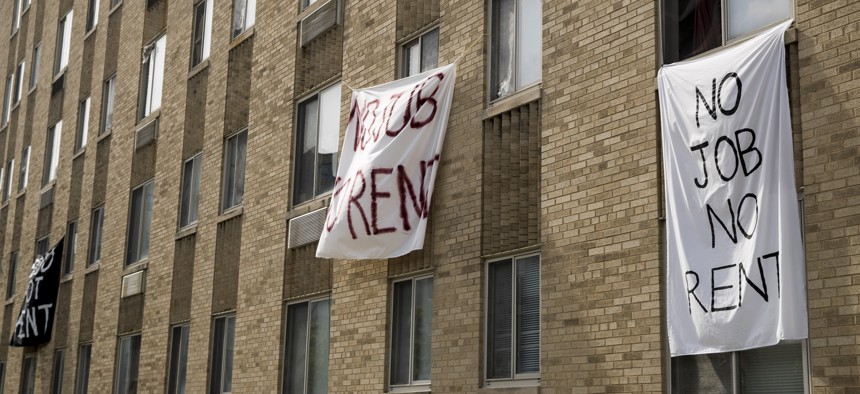Cities, States Providing Legal Aid to Stave off Post-Covid Evictions

Signs reading "No Job No Rent" hang from the windows of an apartment building in Northwest Washington, Wednesday, May 20, 2020. AP Photo/Andrew Harnik
Louisville, Kentucky became the latest city to pass a right to counsel law that will guarantee legal representation for low-income renters. At least 11 states are considering similar measures.
State, local and federal eviction moratoriums are protecting millions of tenants who have fallen behind on rent during the coronavirus pandemic from losing their homes. But as the pandemic subsides, so too are eviction bans.
To stave off an impending eviction wave—which could set off a ripple effect of higher societal costs—cities and states are looking to provide new legal protections for renters by establishing “right to counsel” programs that ensure tenants have legal representation at eviction hearings.
Nine cities have right to counsel laws in place and at least 11 states have introduced legislation this year, according to the National Coalition for a Civil Right to Counsel.
Louisville, Kentucky became the latest city to approve a program when the city council voted last month to use $400,000 in federal coronavirus stimulus money to provide legal services to low-income renters facing eviction.
The need for stronger renter protections was apparent even before the pandemic hit, said Louisville Metro Councilwoman Cassie Chambers Armstrong, who sponsored the legislation.
“Kentucky has some of the least home-renter friendly processes in place in the country,” she said. “That has come to the forefront during the pandemic.”
By guaranteeing legal representation to low-income renters during the eviction process, Chambers Armstrong believes renters who may have fallen on hard times during the pandemic will have a better shot at remaining in their homes while they apply for rental assistance programs that can help them catch up.
The councilwoman modeled Louisville’s legislation after a program established last year in Cleveland. In its first six months, the Cleveland program provided legal aid in 323 eviction cases and reported that 93% of households were able to avoid an eviction or a move.
Louisville’s program will provide free legal services to any tenant with at least one child whose gross annual income falls below 125% of the federal poverty guideline. Legal services will be provided by the Legal Aid Society and the Coalition for the Homeless.
Chambers Armstrong is hopeful that the city will be able to get the program up and running before the end of June, when the federal eviction moratorium issued by the Centers for Disease Control and Prevention is set to expire.
State legislatures in Washington and Maryland also both approved right to counsel laws this year that will establish the first state-run systems in the country.
Renters are traditionally at a disadvantage in eviction cases, said John Pollock, the coordinator for the National Coalition for a Civil Right to Counsel.
While landlords have legal representation in an estimated 90% of eviction cases, fewer than 10% of tenants come to court with an attorney. When tenants have legal representation, there is more balance to the process and tenants are much less likely to be evicted, Pollock said. One study found that evictions decreased 77% in New York when tenants were provided legal counsel.
Even if a tenant is ultimately evicted, providing legal representation can help the tenant negotiate issues like the amount of time they have to find new housing and vacate the property or whether the eviction will be officially recorded—something that can harm their chances of securing new housing, Pollock said.
Growing Legal Protections for Renters
Since New York City first passed a right to counsel law covering evictions in 2017, momentum for similar legal protections has grown across the country. But the economic impacts of the coronavirus pandemic have brought the issue into sharper for many lawmakers, Pollock said.
“The numbers may go down eventually, but they are seeing now this is a crisis and it’s not going to stop being a crisis after the pandemic ends,” he said.
Currently, the CDC’s federal eviction moratorium provides protections for the nation’s 43 million renters. The moratorium is slated to end in June, but it’s the subject of an ongoing legal battle and could be forced to end sooner. A patchwork of state and local moratoriums also provide some protections.
It’s unclear exactly how many renters could face evictions when moratoriums are lifted. In August, the Aspen Institute estimated that as many as 40 million renters could be at risk of eviction if moratoriums were lifted at that point in time. More recently, the Census Bureau’s Household Pulse Survey found about 6.8 million households were behind on rent payments at the end of April.
For comparison, about 10 million homes were foreclosed amid the Great Recession.
Princeton University’s Eviction Lab tracks eviction court filings in five states and 28 cities. Researchers there found that the number of evictions filed during the pandemic is 65% below annual historical averages.
The researchers said the lower levels of evictions are evidence that moratoriums and rental assistance programs are likely helping renters whose livelihoods have been negatively affected by the pandemic. But they warn that when those assistance programs stop or the eviction bans are lifted, the number of evictions is likely to skyrocket.
In Louisville, Chambers Armstrong said she expects the city’s legal services to be heavily used in its first year after the federal moratorium expires. But she hopes to collect data on how the program is used to justify its permanent expansion.
“The pandemic has really shown a bright light on the holes that existed in our social services network,” she said.
Andrea Noble is a staff correspondent with Route Fifty.
NEXT STORY: Atlantic Hurricane Season Starts June 1 – Here’s What Forecasters Are Watching Right Now





